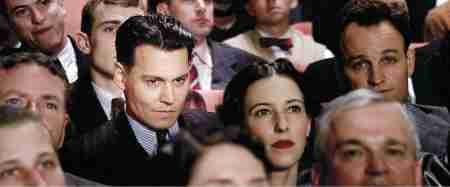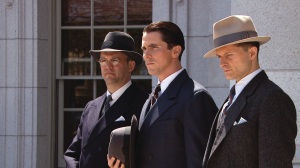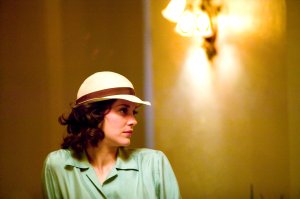
Stranger stop and wish me well,
Just say a prayer for my soul in hell.
I was a good fellow, most people said,
Betrayed by a woman dressed all in red.
It’s taken me some time to gather my thoughts on Michael Mann’s Public Enemies (2009). I actually went to see the film twice — the first time being two weeks ago at Milwaukee’s Landmark treasure, the Oriental Theater, and the second time at an IPic theater at Bayshore Mall.
Initially, I was incredbly disappointed in this production. I made my way to the Oriental with high hopes, eagerly anticipating what I thought would be a stellar production filmed, literally, in my backyard. I was in Columbus, WI in early 2008 when they were filming the getaway after John Dillinger’s second prison break. You can see the downtown area retrofitted to 1934 as Johnny et al. cruise out of town in a stolen Ford coupe. That being said, I still don’t think I had wildly unrealistic expectations about this film. What I saw, however, was a visual mess. The lighting in almost every scene was dingy, the camera movements jarring and unnerving, and the sound jagged and piercing. All the actors appeared haggard, above and beyond the grit that is called for in any gangster picture. At least twice, the digital picture pixelated. I felt as though this was quite possibly one of the ugliest films I had ever seen.
Coming in to work the following Monday, I discussed the film with a friend of mine who had also seen it that weekend, but at a different theater. She was incredulous when I told her my disgust with the production, which rather surprised me because I know there is no way she could have loved the same film that I saw. After doing some internet digging, I came across an article describing how some theaters are not equipped to properly show digital films. This immeditely caught my attention, and I decided that I would give Public Enemies another shot, but this time at a theater that I knew could handle digital. And boy, am I glad that I did.
 Michael Mann’s 142-minute adaptation of John Dillinger’s two-year crime spree across the Midwest must have been a daunting prospect to tackle. Over five hundred pages of history had to be condensed into a two-hour feature film, a task that required some blurring of fact and forsaking of significant character development. Johnny Depp really shines as the swaggering, self-assured Dillinger, expertly capturing the charisma that held the public’s attention and adultation, despite the fact that it belonged to a criminal. This charisma remains largely on the surface, however, because the scripted events of Dillinger’s life do little to reveal much motivation beyond infatuation (his love for Marion Cotillard’s Billie Frechette) and perfunctory loyalty to his criminal comrades. Christian Bale is G-man Melvin Purvis, driven to prove the FBI’s worth as first-rate crime fighters on the strength of utilizing “scientific techniques.” Bale’s Purvis is really not given much to do, other than appear concerned when his officers are gunned down by Dillinger and Baby Face Nelson or artificially confident in the face of the Bureau’s glaring lack of field experience. This isn’t Bale’s fault — his Bruce Wayne/Batman is an excellent update of the legendary comic book hero, example enough of his skills as an actor. I think the fault lies largely with the screenwriters, who seem rather hesitant to provide this film with a real focus and instead resort to the thrills of firefights and chase scenes. Cotillard speaks with only traces of a French accent, which is a rather nice touch for her turn as Billie, who is half French-Canadian. The rather sorry upbringing that the real Billie Frechette had is only glanced at during the film, explained in the minutes following her and Dillinger’s first night together. Frechette and Dillinger were drawn to each other in part because of this shared desire to escape from their personal histories, but this motivation is lost during the film. Their relationship is consequently reduced to a whirlwind romance, cemented with the motions of love rather than the emotion itself. Dillinger’s farewell to Billie is poignantly played, however, as Cotillard softly weeps at his final words: Bye bye, blackbird.
Michael Mann’s 142-minute adaptation of John Dillinger’s two-year crime spree across the Midwest must have been a daunting prospect to tackle. Over five hundred pages of history had to be condensed into a two-hour feature film, a task that required some blurring of fact and forsaking of significant character development. Johnny Depp really shines as the swaggering, self-assured Dillinger, expertly capturing the charisma that held the public’s attention and adultation, despite the fact that it belonged to a criminal. This charisma remains largely on the surface, however, because the scripted events of Dillinger’s life do little to reveal much motivation beyond infatuation (his love for Marion Cotillard’s Billie Frechette) and perfunctory loyalty to his criminal comrades. Christian Bale is G-man Melvin Purvis, driven to prove the FBI’s worth as first-rate crime fighters on the strength of utilizing “scientific techniques.” Bale’s Purvis is really not given much to do, other than appear concerned when his officers are gunned down by Dillinger and Baby Face Nelson or artificially confident in the face of the Bureau’s glaring lack of field experience. This isn’t Bale’s fault — his Bruce Wayne/Batman is an excellent update of the legendary comic book hero, example enough of his skills as an actor. I think the fault lies largely with the screenwriters, who seem rather hesitant to provide this film with a real focus and instead resort to the thrills of firefights and chase scenes. Cotillard speaks with only traces of a French accent, which is a rather nice touch for her turn as Billie, who is half French-Canadian. The rather sorry upbringing that the real Billie Frechette had is only glanced at during the film, explained in the minutes following her and Dillinger’s first night together. Frechette and Dillinger were drawn to each other in part because of this shared desire to escape from their personal histories, but this motivation is lost during the film. Their relationship is consequently reduced to a whirlwind romance, cemented with the motions of love rather than the emotion itself. Dillinger’s farewell to Billie is poignantly played, however, as Cotillard softly weeps at his final words: Bye bye, blackbird.
 This second time around, I saw incredibly pleased to see cinematography that did not assault my eyes. The scenes of Dillinger and Frechette’s vacation in Arizona is bathed in this wonderful yellow glow, softly saturating the picture with warmth and sunlight. As long as the camera remained relatively still, the picture revealed a crystal focus. I could see the pores and textures of skin as well as the minutest details of costume fabrics. The sound was much smoother as well, with more polished variances but just enough roughness to suggest the grit of a gangster flick. The explosions of gunfire took on a rawness that lent very well to a realistic feel, not the usual cleanliness of a more stylized picture. I was still bothered by the hand-held movements of the camera in some scenes, such as the woodland battle at Little Bohemia. The time spent with this jarring movement was minimal, however, and excusable in the larger scheme of the film’s camerawork.
This second time around, I saw incredibly pleased to see cinematography that did not assault my eyes. The scenes of Dillinger and Frechette’s vacation in Arizona is bathed in this wonderful yellow glow, softly saturating the picture with warmth and sunlight. As long as the camera remained relatively still, the picture revealed a crystal focus. I could see the pores and textures of skin as well as the minutest details of costume fabrics. The sound was much smoother as well, with more polished variances but just enough roughness to suggest the grit of a gangster flick. The explosions of gunfire took on a rawness that lent very well to a realistic feel, not the usual cleanliness of a more stylized picture. I was still bothered by the hand-held movements of the camera in some scenes, such as the woodland battle at Little Bohemia. The time spent with this jarring movement was minimal, however, and excusable in the larger scheme of the film’s camerawork.
The bottom line: definitely go see this film if you have not already done so. However, please make sure your choice of theater is equipped for digital — call ahead if you have to. You will not be sorry. Public Enemies is one of the finest offerings of the summer box office.
